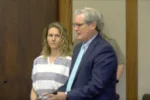In Georgia, a serious incident has sparked a big conversation about justice and policing. Recently, a deputy named Sgt. Buck Aldridge shot and killed Leonard Allen Cure during a traffic stop. This event raised many questions, especially since Cure had been wrongfully convicted before. The district attorney decided not to charge Aldridge, saying he acted in self-defense. However, Cure’s family disagrees, claiming this decision shows that police can escape consequences for their actions. Let’s dive deeper into this situation and explore the different viewpoints on justice and police accountability.
| Category | Details |
|---|---|
| Incident Date | October 16, 2023 |
| Location | I-95, Camden County, Georgia |
| Involved Officer | Sgt. Buck Aldridge |
| Victim | Leonard Allen Cure, 53 |
| Charge Status | No charges filed against Aldridge |
| DA Statement | Use of deadly force was justified |
| Cure’s Legal Response | Family’s attorneys call it a failure of justice |
| Cure’s Background | Previously exonerated for robbery |
| Legal Action | Federal lawsuit against Aldridge and Camden County Sheriff |
| Allegations Against Aldridge | History of misconduct and unlawful use of Taser |
| Family’s Statement | Fight for accountability for police violence |
Understanding the Incident: What Happened?
On October 16, 2023, a traffic stop on I-95 led to a tragic event involving Camden County Sheriff’s Staff Sgt. Buck Aldridge and Leonard Allen Cure. Aldridge pulled over Cure, who had been previously exonerated for robbery. When Aldridge asked Cure to exit his truck and follow his orders, Cure resisted, refusing to comply. This situation escalated quickly, leading to Aldridge using a Taser and ultimately firing his weapon during a struggle.
The district attorney, Keith Higgins, stated that Aldridge acted reasonably by using deadly force because he felt he was being overpowered. This decision has sparked a lot of discussion and disagreement. Cure’s family and their attorneys believe that Aldridge’s actions were unjustified and that this incident reflects a larger issue with police accountability.
The Aftermath: Legal Implications and Reactions
Following the shooting, Cure’s family filed a federal lawsuit against Aldridge and the Camden County Sheriff. They argue that Aldridge’s actions were not only unlawful but also a continuation of a pattern of misconduct. The attorneys for Cure’s family, Ben Crump and Harry Daniels, stated that this situation highlights a critical issue in law enforcement regarding accountability and the use of excessive force.
Public reaction has been intense, with many expressing concern over the decision not to charge Aldridge. Critics argue that it sends a dangerous message about police conduct. Cure’s family vows to continue their fight for justice, emphasizing that this case is about more than just one individual—it’s about advocating for all families affected by police violence and seeking meaningful changes in the system.
Understanding the Context of Police Use of Force
The use of force by law enforcement has always been a contentious issue, especially in cases involving deadly force. In the incident involving Leonard Allen Cure, the justification provided by the prosecutor hinges on the perceived threat to the deputy’s safety. This highlights a critical aspect of law enforcement: the split-second decisions officers must make during high-stress situations. Understanding these dynamics is essential for comprehending how such incidents unfold and the legal frameworks that govern them.
Moreover, the public’s perception of police use of force is shaped by both media coverage and personal experiences. In cases where deadly force is employed, questions arise regarding the proportionality of the response. Critics often argue that officers must be held to a higher standard, especially when prior records of misconduct exist. This incident, like many others, brings to light the ongoing debate about the accountability of law enforcement and the need for reform in policing practices.
The Aftermath of Wrongful Convictions
Leonard Allen Cure’s tragic end is particularly poignant given his previous wrongful conviction. The emotional toll of being exonerated only to face another life-threatening encounter is profound, not just for Cure but for his family as well. This case underscores the systemic issues surrounding wrongful convictions, which often leave individuals grappling with stigma and trauma long after their names are cleared. It raises important questions about the support systems in place for those wrongfully convicted.
Furthermore, the lingering implications of wrongful convictions extend beyond the individuals affected; they touch upon societal trust in the justice system. When an exonerated individual is killed in a police encounter, it amplifies the call for justice reform and accountability within law enforcement. The need for comprehensive policies that prevent such tragedies is urgent, highlighting the necessity for a legal framework that not only seeks justice for the wrongfully convicted but also ensures protection from future injustices.
Legal Ramifications and Community Reactions
The decision not to file charges against Sgt. Buck Aldridge has sparked significant backlash from the community and legal experts alike. The assertion by Cure’s attorneys that this ruling represents a failure of justice reflects a broader sentiment among those advocating for police accountability. Many community members feel that such decisions allow law enforcement to operate without sufficient oversight, fostering an environment where excessive use of force may go unchecked. This incident serves as a rallying point for advocates demanding change.
Moreover, the ongoing federal lawsuit against Aldridge and Camden County Sheriff Jim Proctor illustrates how legal avenues are being pursued to seek accountability. As the family of Leonard Cure continues their fight, the case could set important precedents regarding police conduct and the use of force. The community’s reaction highlights a growing awareness and activism surrounding police violence, as citizens increasingly demand transparency and reform in law enforcement practices.
The Role of Advocacy in Police Accountability
Advocacy plays a crucial role in addressing issues of police violence and accountability. Prominent civil rights lawyers like Ben Crump and Harry Daniels are at the forefront of this movement, using their platforms to highlight systemic failures within law enforcement. Their commitment to seeking justice for victims like Leonard Cure not only provides a voice for the families affected but also encourages broader societal dialogue about police reform. Advocacy efforts are vital in pushing for legislative changes that can prevent further tragedies.
Moreover, community organizations are increasingly mobilizing to demand transparency and accountability from law enforcement agencies. The collective voice of the community, combined with legal advocacy, can exert pressure on policymakers to enact meaningful reforms. As public awareness grows, the call for accountability becomes louder, reminding us that every case of police violence has far-reaching implications for the community and the justice system as a whole.
Frequently Asked Questions
What happened during the traffic stop involving Leonard Cure?
During the traffic stop, **Leonard Cure** did not follow the officer’s orders. After refusing to comply, he attacked the officer, which led to the officer using his gun.
Why did the prosecutor decide not to charge the deputy?
The prosecutor said the deputy acted **justifiably** because he was being overpowered during the incident. This means he felt his life was in danger at that moment.
What do Leonard Cure’s family and lawyers think about the decision?
Cure’s family and lawyers believe this decision is a **failure of justice**. They feel it sends a message that police can harm people without facing consequences.
What is a Taser and how is it used by police?
A **Taser** is a device that can deliver an electric shock to temporarily disable a person. Police use it to control situations without using a gun, but it must be used appropriately.
What are the main concerns about police actions in this case?
The main concerns include **police accountability** and whether officers are using force appropriately. People want to ensure that police actions are fair and justified.
What does it mean to have a wrongful conviction?
A **wrongful conviction** happens when a person is found guilty of a crime they did not commit. Leonard Cure had previously experienced this, making his later death even more tragic.
What actions are Leonard Cure’s family taking now?
Cure’s family is filing a **federal lawsuit** against the officer and the sheriff, seeking accountability for what they believe was excessive force during the traffic stop.
Summary
The content discusses the decision by a Georgia prosecutor not to charge a deputy who shot and killed Leonard Allen Cure during a traffic stop. District Attorney Keith Higgins stated that the deputy’s use of deadly force was justified as he was being overpowered. However, Cure’s attorneys criticized this decision as a failure of justice, highlighting Cure’s struggle to reclaim his life after a wrongful conviction. Footage shows Cure resisting arrest, leading to a confrontation with the deputy. Cure’s family has filed a federal lawsuit against the deputy, seeking accountability for alleged police misconduct and violence.







